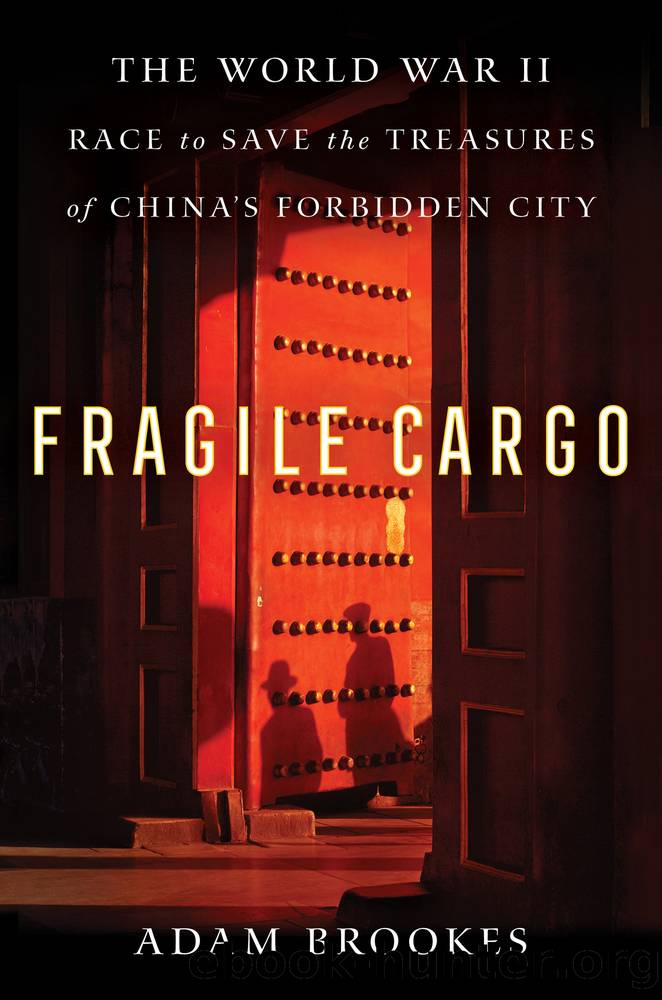Fragile Cargo by Adam Brookes

Author:Adam Brookes
Language: eng
Format: epub
Publisher: Atria
Published: 2023-02-14T00:00:00+00:00
* * *
When the steamers reached the feet of the great red sandstone Buddha at Leshan, they moored at transfer points along the river, where low-sided, shallow-draft wooden boats and barges awaited them. For Ouyang Daoda, this last leg of the journey, just nine miles of shallow water, was a logistical nightmare: the Dadu River, which would take the cases the last brief leg to the little town of Angu, was filled with sandbars and other hazards. He hired engineers to dynamite rocks and awkward promontories that might obstruct the boatsâ voyage upriver. He ordered channels and unloading points to be dredged and cleared. He hired porters to carry out the tricky, nerve-jangling transfers from the steamersâ holds to the decks of the boats. The boats would have to move upstream against the Daduâs strong current, so Ouyang Daoda hired trackers and great coils of bamboo rope to haul them.
On arrival at Angu, the plan envisaged the boats mooring at different points along the riverbank, each as close as possible to the storage facility designated for its cargo. Laborers would unload the boats and carry the cases, one at a time, slung beneath shoulder poles, up to half a mile across fields and along muddy paths. It was a gargantuan, backbreaking task, and manpower was hard to find. September was harvest season, and most men were busy in the fields. A road was under construction too, and road building paid more than portering. Ouyang Daoda scoured the area for boats and labor. He went to the local government, to the boatmenâs union, to salt producers and coal mines. To load the boats safely, he needed skilled professional porters. For those whose job would be to carry the cases across the fields, he recruited among local farmers and itinerant laborers. He negotiated rates of pay through complex formulas relating to the number of cases carried, the distance carried, the size and weight. By the time the first steamers arrived, in July 1939, he was ready.
It was awkward, slow work in the humidity and heat of the Sichuan summer. The sweating porters loaded fifty or sixty cases aboard each boat. The trackers fixed their ropes of braided bamboo to the prow of the boat and hauled, driving their feet into the sandy riverbank, chanting to keep time. The boats rode deep in the water, the steersmen working the tillers hard to keep them off the shoals. Ouyang Daoda could only watch from the bank. The cases and their invaluable, esoteric contents had traveled two thousand miles and more since leaving the Forbidden City six years earlier. Now imperial treasures of porcelain and jade, of fine silk and brittle paper, lay in flimsy wooden boats, their fate utterly reliant on the dexterity of the steersmen and the knotted musculature of the trackers, men paid in copper coin and rice, illiterate, who dwelled in huts of mud and straw by the river.
Ouyang Daoda was watching when a loaded boat left a jetty at Dujiachang, close to the great stone Buddha.
Download
This site does not store any files on its server. We only index and link to content provided by other sites. Please contact the content providers to delete copyright contents if any and email us, we'll remove relevant links or contents immediately.
| Central Asia | Southeast Asia |
| China | Hong Kong |
| India | Japan |
| Korea | Pakistan |
| Philippines | Russia |
The Rape of Nanking by Iris Chang(3531)
The Sympathizer by Viet Thanh Nguyen(3528)
World without end by Ken Follett(3016)
Ants Among Elephants by Sujatha Gidla(2932)
Blood and Sand by Alex Von Tunzelmann(2615)
Japanese Design by Patricia J. Graham(2565)
City of Djinns: a year in Delhi by William Dalrymple(2140)
Inglorious Empire by Shashi Tharoor(2108)
In Order to Live: A North Korean Girl's Journey to Freedom by Yeonmi Park(2064)
Foreign Devils on the Silk Road: The Search for the Lost Treasures of Central Asia by Peter Hopkirk(2061)
Tokyo by Rob Goss(2025)
India's Ancient Past by R.S. Sharma(1994)
India's biggest cover-up by Dhar Anuj(1992)
The Great Game: On Secret Service in High Asia by Peter Hopkirk(1965)
Tokyo Geek's Guide: Manga, Anime, Gaming, Cosplay, Toys, Idols & More - The Ultimate Guide to Japan's Otaku Culture by Simone Gianni(1953)
Goodbye Madame Butterfly(1942)
The Queen of Nothing by Holly Black(1770)
Living Silence in Burma by Christina Fink(1738)
Batik by Rudolf Smend(1726)
